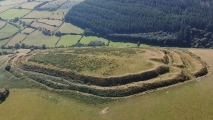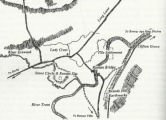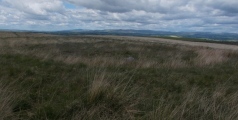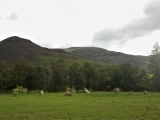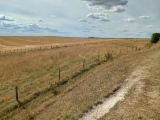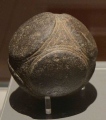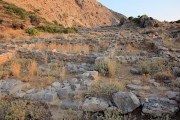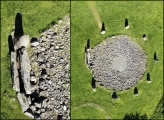Andy Burnham's Blog, page 130
September 2, 2022
Caer Caradoc (Chapel Lawn)
This is the more southerly of two hillforts in Shropshire named Caer Caradoc. The earthworks are well preserved with several ditches at least one entrance. The fort is accessible via a footpath on either side, sheep roam over the hill and there is a fair bit of gorse growing on the top. On a clear day looking towards the east from the gates you can see the standing stone of Pen-y-cwm.
Published on September 02, 2022 03:17
September 1, 2022
Clifton Pile Settlements
Commercial sand and gravel extraction and quarrying by the River Trent at Attenborough began as early as 1929 and has continued almost to the present day. As well as leaving a legacy of scenic lakes and environment for wild-life, both sites have produced some interesting and revealing archaeology. Perhaps one of the more remarkable finds came as the result of gravel extraction of a different kind. In 1938, workmen from the Trent Navigation Company were dredging gravel in the Trent below Clifton Grove when their progress was stopped by wooden stakes or piles driven into the river bed.
Published on September 01, 2022 10:26
August 31, 2022
Hare Hill ring cairn
A lovely little banked cairn in a spectacular location overlooking the upper Aire valley and Ribble valley over to the forest of Bowland. Views of Pendle hill to SWW, and Ingleborough, Pen y Ghent to the NW. Many of the peaks of the Dales to the north also. The cairn is located in a plateau at 280m OD below Pitshaw beacon at 388m OD, just over 2km north of the other cairns on Bleara moor. I thought the bank and ditch quite distinct and in good condition compared to the descriptions.
Published on August 31, 2022 01:39
August 29, 2022
Spittal of Glenshee Modern Stone Circle
Pete Crane writes: This recumbent stone circle at Spittal of Glenshee looks to be modern, probably c 2022. It's not on any of the aerial photos or maps old & new. I'd love to know the story behind this installation. Does anyone know? Found while visiting the standing stone nearby.
Published on August 29, 2022 06:21
Roughridge Hill Long Barrow
A Neolithic long barrow situated on Roughridge Hill, to the south of Wansdyke. The barrow mound measures about 75 metres long and up to 32 metres wide. It stands up to about 1 metre high. Flanking the mound, but no longer visible at ground level due to the spreading of the mound caused by ploughing, are two quarry ditches which will survive as buried features. Scheduled.
Published on August 29, 2022 06:20
St Oswald's Church (Dean)
Church in Cumbria containing a large cup and ring marked boulder, and medieval grave slabs, the latter being built into the fabric of the building. Just to the south of the nave is a preaching/churchyard cross. St Oswald's Church is largely C12 with C13 and C15 extensions and C17 alterations.
Published on August 29, 2022 04:42
August 25, 2022
Kelvingrove Museum and Art Gallery
Twilight Tour: Neolithic Carved Stone Balls, 7th September at Kelvin Hall, which is opposite the main museum and art gallery, more on our page. Museums in Lanarkshire, prehistory collection including the Glas Ghu cupmarked stone, carved stone balls and much much more.
Published on August 25, 2022 13:24
Chalasmenos
The Late Minoan (LM) IIIC settlement of Chalasmenos is located on a low hill (240 m above sea level) immediately to the south of the Cha Gorge near the village of Monastiraki in eastern Crete. The settlement was relatively large for the period, comprised of an estimated 4,000 m², and provides evidence for a degree of urban planning. The site was divided into four quarters, which were separated by roughly paved pathways, and an open, triangular-shaped area (plateia) occupied the centre of the settlement (a contemporary kiln was also found at the northern end of this open area).
Published on August 25, 2022 09:05
August 23, 2022
Loanhead Of Daviot
Summer solstice shadow casting at Loanhead of Daviot. Constructed sometime around 2500 B.C., Loanhead of Daviot is a recumbent stone circle comprised of a large recumbent stone, two stones flanking the recumbent stone, and eight other stones in a circle that is 67 feet in diameter. In the middle of the low Bronze Age cairn within the circle is a rectangular mortuary pit, which may be the oldest part of the site.
Published on August 23, 2022 10:20
August 22, 2022
Alignements du Moulin S
The Alignements du Moulin, near the town of Redon in Brittany are three very different alignments of menhirs which make up part of the Saint-Just group of megalithic sites. There are two long roughly parallel lines running east west with a third less well defined row to the southwest running in a north south direction.
Published on August 22, 2022 11:31

